Upper respiratory infections in felines can often mimic the symptoms of a common cold in humans, leading cat owners to question if their furry companions might be experiencing a similar ailment.
However, the underlying causes and management of these infections in cats involve a distinct set of considerations that warrant attention.
By exploring the nuances of feline upper respiratory infections, we can unravel the complexities surrounding this prevalent health issue and gain insights into effectively safeguarding the well-being of our beloved feline friends.
Key Takeaways
- Feline upper respiratory infections are often caused by viruses like feline herpesvirus type 1.
- Proper diagnosis involves symptom evaluation and testing for targeted treatment.
- Antibiotics are prescribed for bacterial infections, with adherence to the full course being crucial.
- Humidifying the air and using wet food aid in the recovery of cats with respiratory infections.
Understanding Feline Upper Respiratory Infections
Feline upper respiratory infections are common viral infections in cats, often caused by pathogens such as feline herpesvirus type 1, impacting the respiratory system and overall health of the affected felines. These infections manifest through symptoms like sneezing, nasal discharge, coughing, and eye discharge. Cats may also exhibit lethargy, loss of appetite, and fever.
Prompt veterinary care is essential to diagnose and treat these infections effectively. Veterinarians may recommend antibiotics for bacterial complications and supportive care to alleviate symptoms. Additionally, providing a stress-free environment, proper nutrition, and maintaining good hygiene can aid in the recovery process.
Understanding the nature of these infections is crucial in ensuring the well-being of our feline companions.
Common Causes and Symptoms
Upper respiratory infections in cats commonly arise due to viral pathogens. They present with distinctive symptoms that impact the respiratory system and overall health of affected felines. Cats infected with viruses such as feline herpesvirus type 1 or calicivirus may exhibit symptoms like sneezing, nasal discharge, coughing, and lethargy. Additionally, ocular symptoms such as eye discharge or redness may be present. These infections can lead to decreased appetite, fever, and difficulty breathing, especially in severe cases.
It's essential to monitor your cat for these signs and seek veterinary care promptly. Providing a comfortable and stress-free environment for your cat during this time is crucial for their recovery.
Diagnostic Procedures for Cats
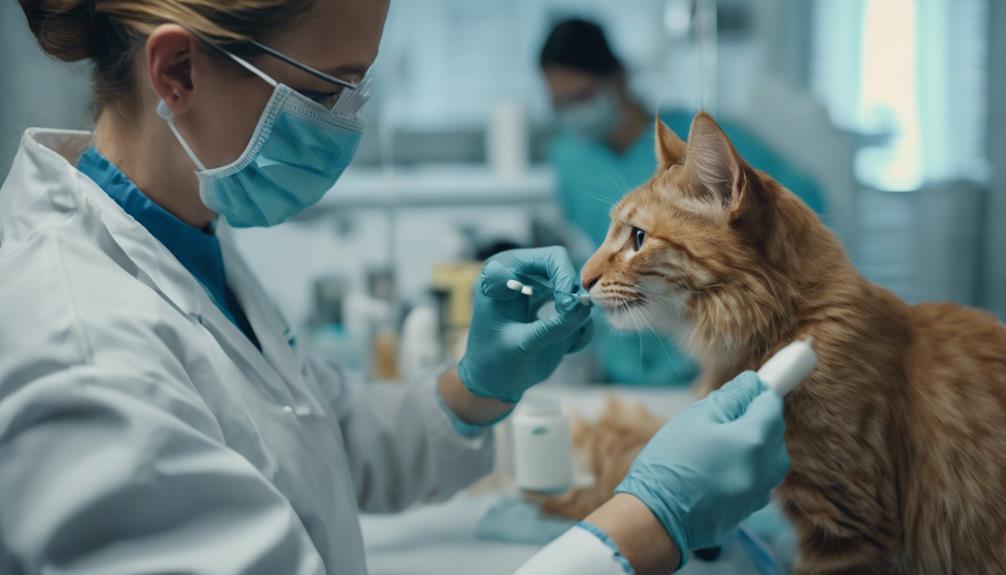
Diagnostic procedures play a crucial role in identifying the specific viral pathogens causing upper respiratory infections in cats, aiding veterinarians in determining the most effective treatment strategies. When your furry friend shows signs of illness, the following diagnostic tests may be conducted:
| Diagnostic Procedure | Description |
|---|---|
| Nasal Swab | Collects samples to identify viruses |
| Conjunctival Swab | Samples from the eyes for testing |
| Throat Swab | Helps detect bacterial infections |
| Blood Tests | Checks for overall health and immunity |
These procedures help pinpoint the exact cause of your cat's respiratory issues, guiding the veterinarian in providing targeted and efficient treatment. By understanding the underlying pathogens, tailored care can be administered to aid your cat in a swift recovery.
Importance of Proper Treatment
Ensuring prompt and appropriate treatment is paramount in addressing feline upper respiratory infections and facilitating a speedy recovery for affected cats. When it comes to treating these infections, here are three key considerations to keep in mind:
- Timely Veterinary Consultation: Seek veterinary care promptly upon noticing any symptoms to receive an accurate diagnosis and tailored treatment plan.
- Adherence to Prescribed Medications: Follow the veterinarian's instructions diligently, especially regarding the administration of antibiotics or other prescribed medications.
- Supportive Care at Home: Implement recommended at-home care strategies such as providing a humidified environment, administering prescribed eye or nose drops, and ensuring adequate nutrition to aid in your cat's recovery process.
Antibiotics and Medication Guidelines
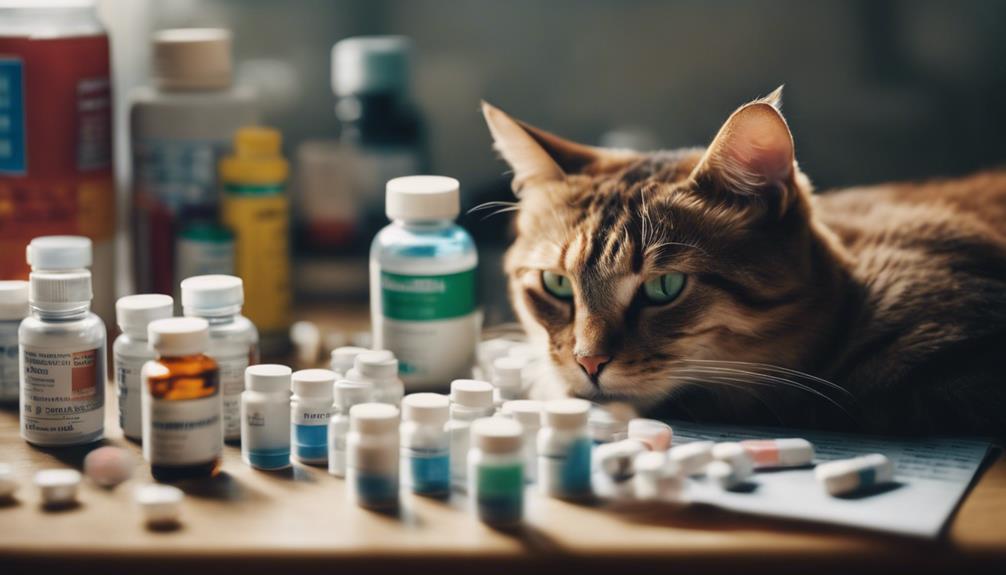
Prompt veterinary consultation is crucial for determining the appropriate antibiotics and medication guidelines for treating feline upper respiratory infections effectively. Veterinarians may prescribe antibiotics for bacterial or secondary viral infections, emphasizing the importance of completing the full course as directed.
Additionally, eye drops, nose drops, and at-home care strategies like humidifying the air can aid in the recovery process. It is vital to follow the veterinarian's instructions closely and provide the prescribed medications to your cat as directed. Proper medication adherence and care can help alleviate symptoms and support your cat's healing journey.
Consulting with a veterinary professional ensures tailored treatment for your cat's specific condition, promoting a quicker and smoother recovery.
Supportive Care for Infected Cats
When caring for cats infected with upper respiratory infections, providing supportive measures such as humidifying the air and administering prescribed medications is crucial for aiding in their recovery. To ensure your feline companion receives the best care during this time, consider the following supportive measures:
- Humidifying the Air: Keep the environment moist to help ease nasal congestion and respiratory discomfort.
- Administering Prescribed Medications: Follow the veterinarian's instructions diligently to manage symptoms effectively.
- Creating a Comfortable Resting Area: Provide a warm and quiet space for your cat to rest and recuperate peacefully.
Nutritional Recommendations for Recovery
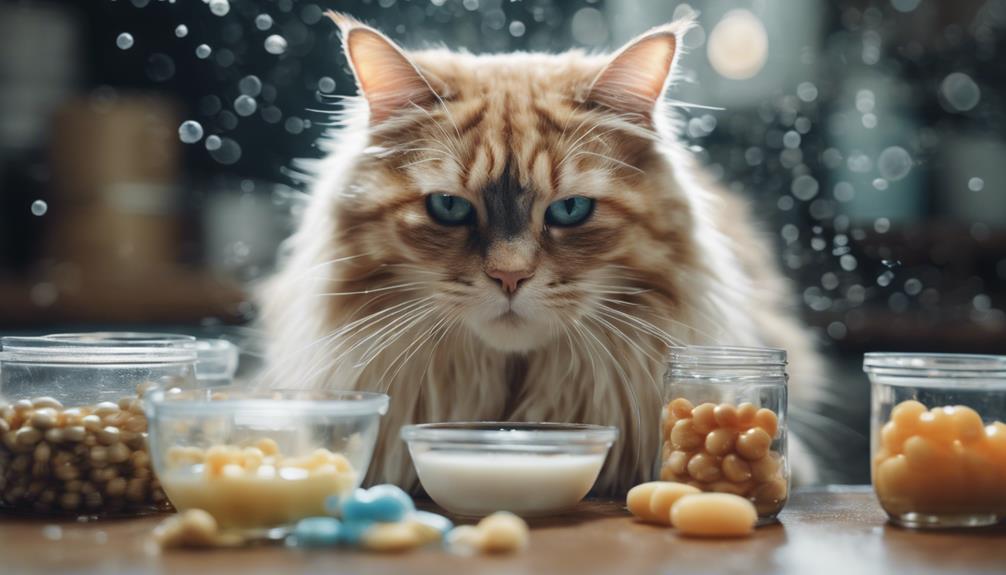
For cats recovering from upper respiratory infections, providing appropriate nutritional support is crucial for their overall well-being and recovery. Feeding canned cat food is often recommended during this time as it is easier for them to swallow, more appealing, and can help with hydration. Wet food is particularly beneficial for cats experiencing sore throats or nasal congestion due to the infection.
Ensuring that your cat receives proper nutrition can aid in their recovery process and strengthen their immune system. It is important to consult with your veterinarian for specific dietary recommendations tailored to your cat's individual needs during their recovery from a feline upper respiratory infection.
Risks of OTC Medications
The administration of over-the-counter medications to cats poses inherent risks and potential harm without proper veterinary guidance. When considering using OTC medications for your cat's upper respiratory infection, keep in mind the following risks:
- Incorrect Dosage: Cats have unique metabolisms, and giving them human medications without proper dosing can lead to toxicity.
- Undesirable Side Effects: Cats may react differently to medications compared to humans, resulting in adverse effects like liver damage or gastrointestinal upset.
- Masking Symptoms: OTC medications may alleviate symptoms temporarily, masking the underlying issue and delaying appropriate veterinary care.
It is crucial to consult with a veterinarian before administering any OTC medications to your cat to ensure their safety and well-being.
Consulting a Veterinarian
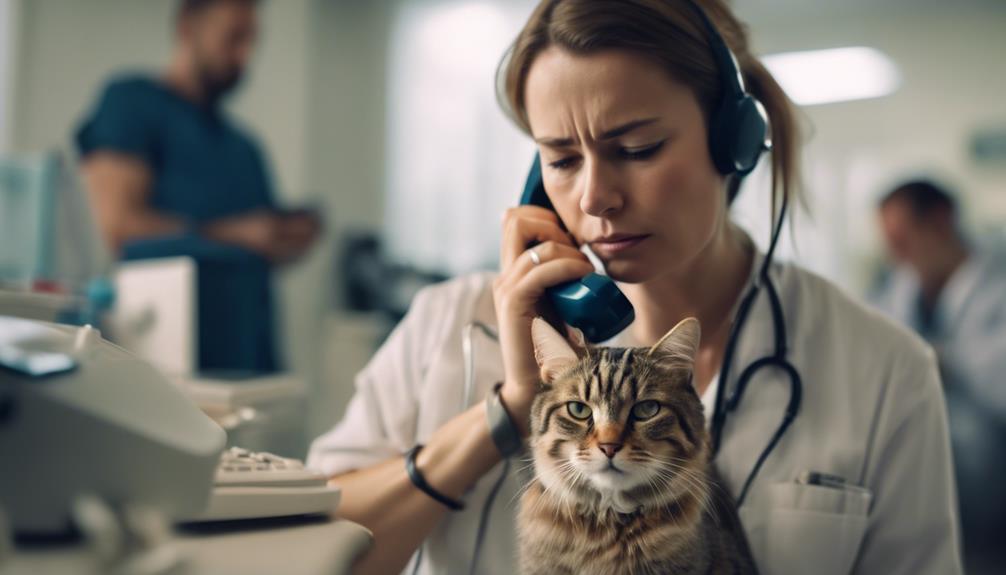
Consulting a veterinarian is paramount for ensuring the appropriate diagnosis and treatment of feline upper respiratory infections, safeguarding the health and well-being of affected cats. Veterinarians possess the expertise to accurately identify the underlying cause of the infection, whether viral or bacterial, through thorough examination and diagnostic testing. They can prescribe the necessary medications, such as antibiotics for bacterial infections or antiviral drugs for viral conditions, tailored to your cat's specific needs.
Additionally, veterinarians can provide guidance on supportive care measures and recommend appropriate at-home strategies to aid in your cat's recovery. Seeking professional veterinary care promptly is crucial in managing feline upper respiratory infections effectively and preventing potential complications that could arise from untreated or improperly managed cases.
Home Humidification Techniques
Implementing proper humidity levels in the home environment can significantly alleviate respiratory distress in cats suffering from upper respiratory infections. Maintaining adequate moisture in the air can help ease nasal congestion and make breathing more comfortable for your feline companion. To effectively humidify your home for your cat's respiratory health, consider the following techniques:
- Use a humidifier in the room where your cat spends the most time to ensure a consistent level of humidity.
- Place water bowls strategically around the house to increase ambient moisture levels.
- Avoid dry environments by using techniques like placing damp towels near heating vents or using a vaporizer to add moisture to the air.
Effective Steam Treatments
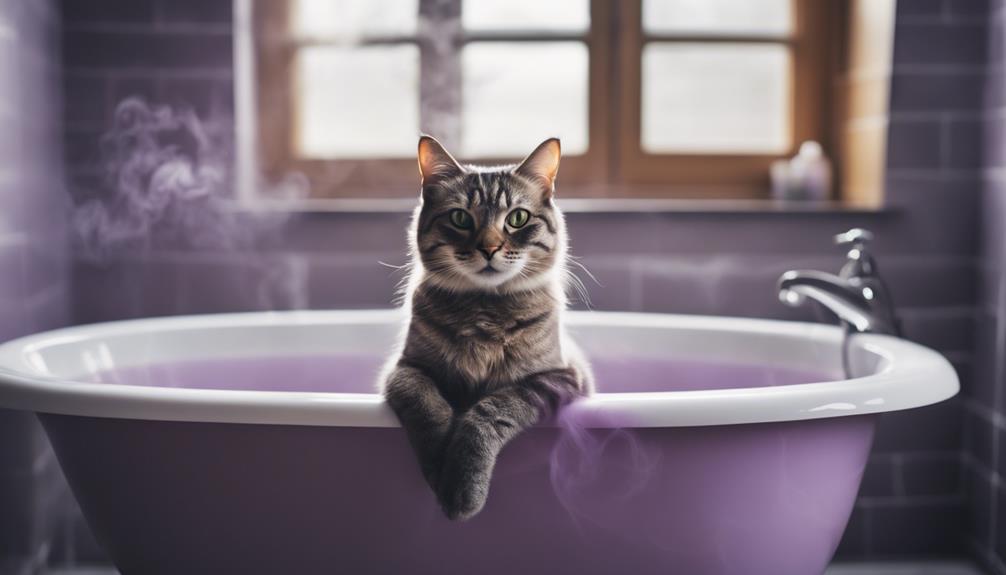
To enhance treatment outcomes for feline upper respiratory infections, incorporating effective steam treatments can provide relief for cats experiencing nasal congestion and respiratory difficulties. Steam treatments help to moisten and loosen mucus in the nasal passages, making it easier for cats to breathe.
Creating a steamy environment in a bathroom by turning on a hot shower or using a humidifier can help alleviate congestion and soothe irritated airways. Ensure the steam is not too hot and that the cat is comfortable in the environment.
This simple yet effective home remedy can aid in enhancing your cat's comfort during the recovery process from an upper respiratory infection.
Vaccination Protocols for Cats
Effective management of feline upper respiratory infections includes vaccination protocols aimed at preventing and minimizing the severity of viral infections like feline viral rhinotracheitis and feline calicivirus. Vaccination strategies play a crucial role in safeguarding your cat's health.
- Vaccinations: Ensure your cat receives regular vaccinations to protect against common viral infections.
- Booster Shots: Follow up with booster vaccines every one to three years to maintain immunity levels.
- Consultation: Consult with your veterinarian to establish a vaccination schedule tailored to your cat's specific needs and lifestyle.
Preventative Measures for Owners
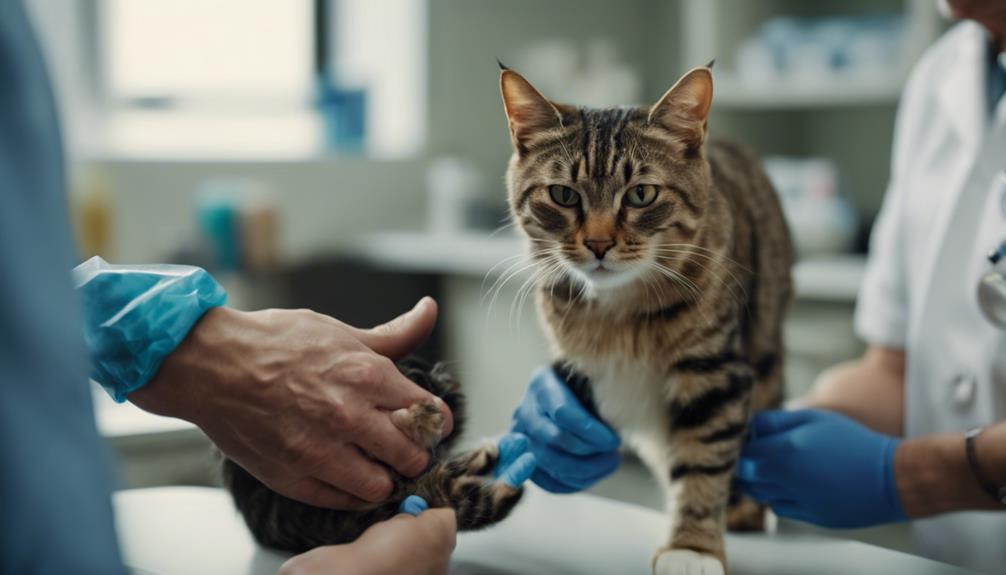
Owners can significantly reduce the risk of feline upper respiratory infections by maintaining a clean and stress-free environment for their cats. Regularly cleaning litter boxes, food and water dishes, and bedding can help prevent the spread of viruses and bacteria.
Providing a balanced diet, plenty of fresh water, and opportunities for exercise can boost the immune system and overall health of cats, making them less susceptible to infections. Minimizing exposure to other sick animals and ensuring routine veterinary check-ups can also play a crucial role in prevention.
Additionally, reducing stress factors such as sudden changes in routine or environment can help keep your cat's immune system strong and resilient against respiratory infections.
Enhancing Immune System Function
Enhancing immune system function in cats is crucial for bolstering their resistance to feline upper respiratory infections. To support your cat's immune system, consider the following:
- Balanced Nutrition: Provide a diet rich in essential nutrients like vitamins C and E to promote immune health.
- Regular Exercise: Encourage physical activity to maintain a healthy weight and overall well-being, which can positively impact the immune system.
- Stress Management: Create a calm and enriching environment for your cat, as stress can weaken the immune response.
Frequently Asked Questions
Can Feline Upper Respiratory Infections Be Transmitted to Humans?
Feline upper respiratory infections are typically not zoonotic, meaning they do not transmit from cats to humans. However, good hygiene practices around sick animals are recommended to reduce the risk of potential transmission of other diseases.
Are There Any Natural Remedies or Alternative Treatments That Can Help Alleviate Symptoms in Cats With Respiratory Infections?
While natural remedies and alternative treatments may be sought for alleviating symptoms in cats with respiratory infections, consulting a veterinarian is crucial. They can provide safe and effective options tailored to the cat's specific condition.
How Long Does It Typically Take for a Cat to Recover From a Feline Upper Respiratory Infection?
Recovery time for feline upper respiratory infections varies but typically lasts 1-3 weeks. Proper treatment, including antibiotics, eye/nose drops, and humidifying the air, aids in quicker healing. Chronic cases may need further evaluation for complete recovery.
Are There Any Specific Breeds of Cats That Are More Prone to Developing Upper Respiratory Infections?
Certain cat breeds like Persians and Siamese are more prone to upper respiratory infections due to their flat faces that can lead to breathing difficulties. Regular veterinary check-ups and preventive care can help manage these risks.
Can Stress or Environmental Factors Contribute to the Development of Feline Upper Respiratory Infections?
Stress and environmental factors can contribute to feline upper respiratory infections. High-stress situations weaken the immune system, making cats more susceptible to infections. Environmental factors like poor ventilation or overcrowding can also increase the likelihood of respiratory issues in cats.
Conclusion
In conclusion, the management of feline upper respiratory infections is crucial for the well-being of cats.
Understanding the causes, symptoms, diagnostic procedures, and treatment options is essential for effective care.
Antibiotics, supportive measures, and vaccination protocols play key roles in combating these infections.
By implementing preventative measures and enhancing the immune system function, cat owners can help prevent the occurrence of upper respiratory infections in their feline companions.




